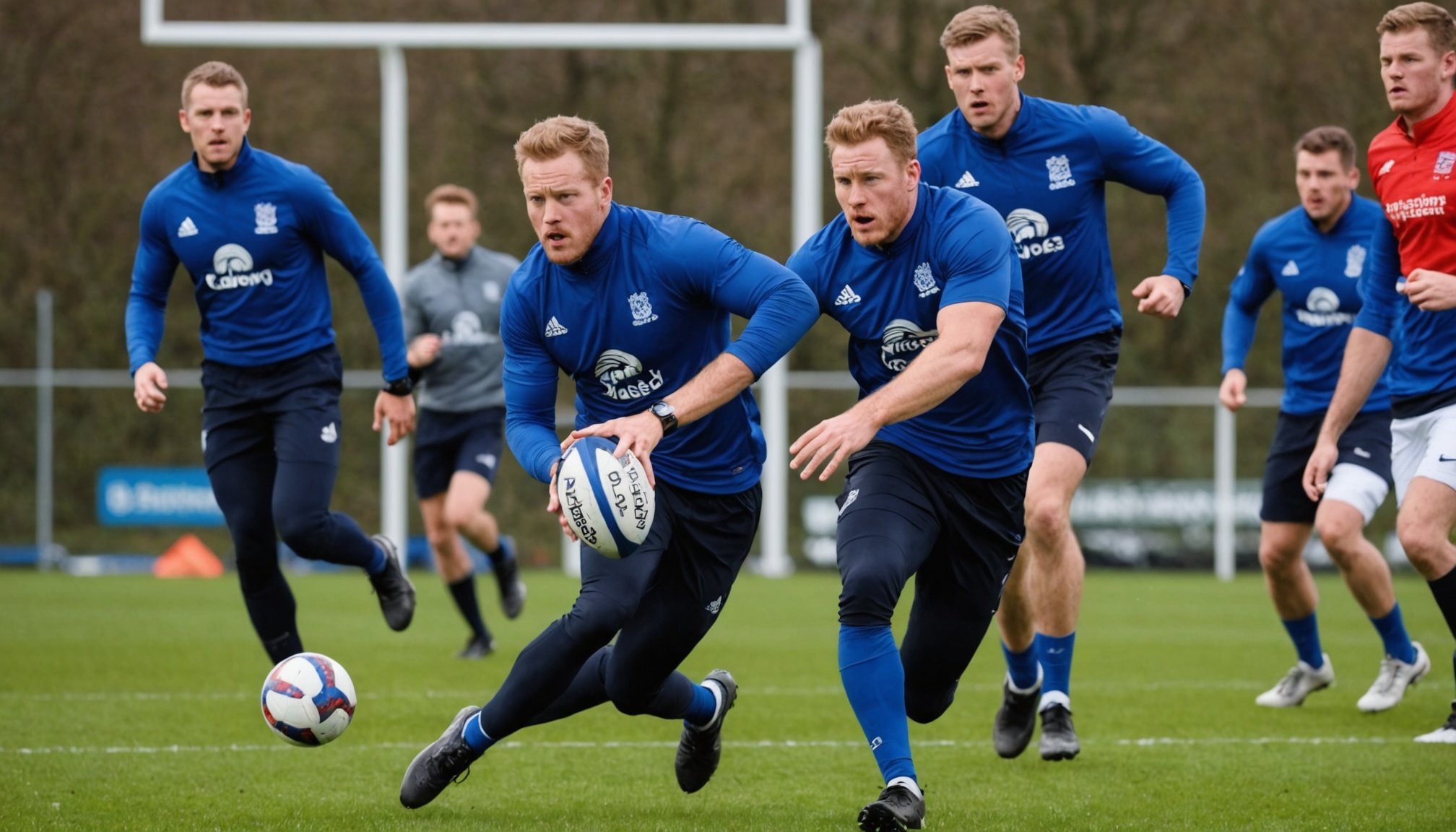Overview of Off-Season Training Innovations
In recent years, the focus on off-season training has intensified among UK sports teams, recognising its pivotal role in enhancing athlete performance. Innovative techniques are reshaping traditional training methods, allowing athletes to maintain and even improve their skills during the off-season. This shift is driven by a blend of cutting-edge technologies and scientific approaches to fitness.
Current trends in UK sports training highlight the integration of wearable technology and data analytics to customise training regimens. Wearable devices monitor various health metrics, providing real-time data critical for making informed decisions. This technology enables coaches to tailor training, ensuring athletes work on areas needing improvement while recovering efficiently.
Also to see : Transforming sports training: how virtual reality is shaping the future of uk athletic teams
Moreover, the introduction of novel recovery strategies such as cryotherapy and floatation therapy exemplifies the advancement in sports science. These methods aim not only to prevent injuries but also expedite recovery, allowing athletes to perform at their peak when competition resumes. By continuously adopting and innovating training techniques, UK sports teams enhance their competitive edge, capitalising on the off-season as a precious opportunity for growth and development.
Advanced Training Methods
Incorporating advanced training techniques is crucial for enhancing athlete performance during the off-season. One pivotal method is strength conditioning, which focuses on building muscular strength, power, and endurance. This training is essential for athletes to improve their explosive power and performance metrics. By utilizing precise periodization strategies, athletes can systematically vary their workouts, ensuring progressive overload while reducing the risk of injury.
In parallel : Nurturing grit: effective strategies for uk sports teams to cultivate a culture of endurance and resilience
Another innovative technique is plyometric training, incorporating explosive movements that improve an athlete’s speed and agility. This method is vital in sports requiring quick changes in direction. Implementing these exercises helps enhance neuromuscular adaptation and coordination, ultimately resulting in faster, more agile athletes.
Functional movement assessments are also gaining traction as a tool to tailor training regimens. These assessments identify movement patterns and potential imbalances, allowing athletes to correct these issues through customized workouts. By focusing on individual weaknesses, athletes can enhance overall performance and reduce injury risks.
Recovery strategies remain an integral part of these methods, with a concentrated emphasis on recovery-focused workouts. Techniques such as these provide athletes with comprehensive development, ensuring they return to their sport stronger and more capable.
Benefits of Technology in Training
Sports technology is revolutionising how athletes train by introducing wearable devices and data analytics. These tools provide invaluable insights into athlete health, tracking metrics like heart rate, calorie expenditure, and sleep patterns. By having access to this data, coaches can make informed decisions, tailoring training programmes to enhance individual performance and well-being.
Furthermore, implementing video analysis has proven instrumental in improving skills. Coaches and athletes can review pivotal moments, such as a jump shot or sprint start, identifying areas that require fine-tuning. This detailed feedback fosters a greater understanding of technique and strategy.
In addition to performance enhancement, technology plays a significant role in injury prevention and recovery. Real-time monitoring helps identify potential issues before they become serious injuries, allowing for smarter workload management and personalised recovery strategies. Wearable devices and data analytics also track recovery progress, ensuring athletes return to play safely and efficiently.
Embracing these technological advances proves advantageous for athletes aiming to maintain peak performance levels. It equips teams with the knowledge needed to create a smarter, more effective training environment, ensuring sustained athlete wellness and excellence in competition.
Success Stories from UK Sports Teams
The exploration of impactful training methodologies has led to remarkable successes for several UK sports teams. By delving into various case studies, one can appreciate the transformative effects of innovative training approaches.
High-Profile Team Examples
Prominent clubs, such as Manchester City, have integrated cutting-edge training techniques, propelling them to the pinnacle of their respective sports. These techniques, including personalised workouts and recovery-focused regimens, have bolstered team resilience and agility.
Performance Metrics and Results
The impact of these new methods is evident through measurable performance metrics. Metrics such as improved speed, strength, and stamina are common outcomes. Success is not merely anecdotal but can be quantified, showcasing the effectiveness of advanced training methods.
Lessons Learned
Analysing athlete feedback has proven critical. Incorporating this input allows teams to fine-tune training cycles, fostering ongoing improvement and avoiding stagnation in performance. Continuous adaptations ensure training remains relevant and impactful.
These insights highlight not only the success of current practices but also outline a blueprint for future athlete development. Teams leveraging these strategies can maintain competitive advantages, demonstrating that innovative training is pivotal to achieving excellence.
Future Trends in Off-Season Training
Off-season training is poised for a revolution with emerging methodologies that emphasise athlete wellness and holistic development. Looking to the future, sports professionals anticipate innovations that challenge traditional approaches, integrating mental and emotional wellness into training regimens. This holistic focus aims to improve resilience and enhance overall athlete performance.
Anticipated Innovations
Expectations include cutting-edge technologies that personalise training experiences. These innovations will enable precise customisation, adapting to the unique needs of each athlete.
Integrating Holistic Approaches
Emphasising mental and emotional aspects is increasingly vital. Training environments are adopting practices that support psychological health, recognising its integral role in performance enhancement.
Sustainability in Training Techniques
Sustainability is gaining traction, with a shift towards eco-friendly practices in sports training. Teams are exploring methods that not only boost performance but also contribute positively to the environment. This approach reflects a broader commitment to sustainable development, ensuring a healthier future for the world of sports.
In summary, the future of off-season training in UK sports teams will be driven by innovation, holistic health, and sustainability, fostering a new era of athlete development.
Expert Contributions and Insights
Delving into sports expertise reveals a growing emphasis on the role of coaches in athlete development. Interviews with accomplished sports professionals highlight the significance of merging traditional wisdom with innovative techniques. Coaches are encouraged to continuously adapt methods and embrace sports technology to keep training relevant and effective.
Coaching tips often stress the importance of maintaining a personalised approach, acknowledging the unique strengths and weaknesses of each athlete. Best practices suggest incorporating advanced data analytics to refine training regimens. With technology driving unprecedented insights into performance, trainers can adjust programs to meet the specific needs of individual athletes, ensuring more substantial progress.
Continuous education is crucial, as it empowers coaches to stay abreast of the latest advancements and implement them strategically. Participation in workshops or seminars aids coaches in acquiring new skills necessary for holistic athlete development.
Ultimately, fostering a culture of innovation and adaptability benefits not only the athletes but the entire sporting community. Through expert insights, teams can solidify their competitive edge, supporting a dynamic and forward-thinking approach to sports training.











